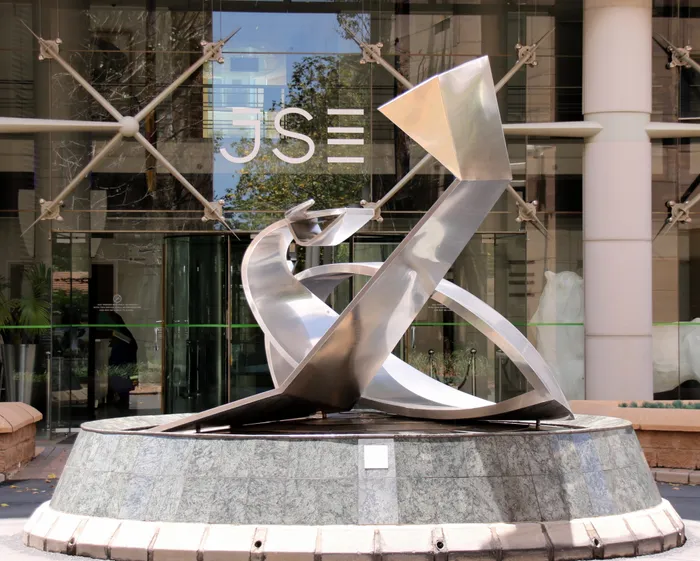Global stock markets, JSE fall hard as South Africa faces political and economic turmoil
Stock markets

Share prices on the JSE fell hard for a second day on Friday, in line with similar declines on other world markets, after the US announced import tariffs on its trading partners last Wednesday.
Image: Supplied
Stock markets around the world got a bloody nose for a second day on Friday, and the JSE All Share Index slumped 5.26% as investors fretted about a global recession arising out of Donald Trump’s import tariffs and an expanding global trade war.
Adding fuel to the fire in South Africa are deepening political risks. There was talk in the US of a review of ties with South Africa given its links with Russia, Iran, and China. Locally, the future of the Government of National Unity also hangs in the balance.
The JSE Resources Index slumped 9.77%, the JSE Precious Metals and Mining Index was down 10.37%, chemical companies fell an average 8.88%, companies making in industrial materials index fell 10.03%, while the JSE Healthcare Index fell 6.06%. Even the gold price - the yellow metal is long believed to be a safe haven asset in times of investor uncertainty - fell 3.47% to R3025.73 per ounce by 5pm Friday.
The Brent crude oil price also slumped 8%, heading for its lowest close since the middle of the Covid pandemic in 2021, as China, in turn, raised tariffs on US goods in the most serious escalation in a global trade war.
The rand traded about 1.5% weaker at 19.0175 per dollar on Friday afternoon, down about 1.5% on Thursday's closing level. The rand plunged more than 3% against the dollar last week.
“The rand has lost substantial ground on the expected exit of South Africa’s second largest political party (the DA) from the coalition government, after the DA voted against the recent budget VAT increases and lack of lower state spending,” said Investec chief economist Annabel Bishop in a note. Indications over the weekend are that the DA and ANC are back in talks about the impasse.
“Global stock markets are falling sharply as fears grow over a worsening trade war between the US and China. China has hit back with its own tariffs and export limits, adding to the tension,” TreasuryONE said in a note.
TreasuryONE said an additional factor driving the slide in the rand were US lawmakers indicating they wish to review the US’s relationship with South Africa, due to South Africa's ties with China, Russia, and Iran, and sanctions on certain South African officials have been mooted.
The slide in global stock markets on Friday was the second day of massive losses on global markets after Trump announced import tariffs against the US’s major trade partners on Wednesday.
Foreign foreign investors had in the quarter to March already pulled out of Asian equities in anticipation of the tariff hikes, pushing stock prices to their lowest level in about 15 years - investors divested stocks worth a net $43.73 billion in India, Taiwan, South Korea, Thailand, Indonesia, Vietnam, and the Philippines in the three months.
In the US, the S&P 500 Index slid 5.97% on Friday, while the Dow Jones Industrial Average fell by 5.50%. In London, the FTSE suffered the biggest one-day drop since early in the pandemic, with the index falling by 5%. Last Wednesday, Trump announced a 30% tariff on all imports from South Africa, which is likely to substantially impact South Africa’s foreign trade with its single biggest trading partner outside of China.
The tariffs could particularly dent South Africa's exports to the US, including vehicles and auto parts, metals, and citrus fruit.
The market downdraft caused by Trump's tariffs saw more than $3 trillion wiped off Wall Street last week, and European and Japanese markets had lost almost $500bn, in an uncomfortable reminder of past market crises, such as the 2008 global financial crisis and the 2020 COVID-19 pandemic, Reuters reported.
South Africa-focused investors, in the meantime, also remain concerned that the pro-business Democratic Alliance (DA) party could leave the coalition government after a dispute over the budget. The DA voted against the budget's fiscal framework and revenue proposals in parliament last week after failing to reach an agreement with the ANC, and it is considering its future in the government of national unity.
PSG Wealth chief investment officer Adriaan Pask said, “the real important issue is how global demand and supply dynamics will be affected as inflationary prices increase when the inherent tax increases, but the reduction in demand for these products needs to be taken into account.”
Business Report